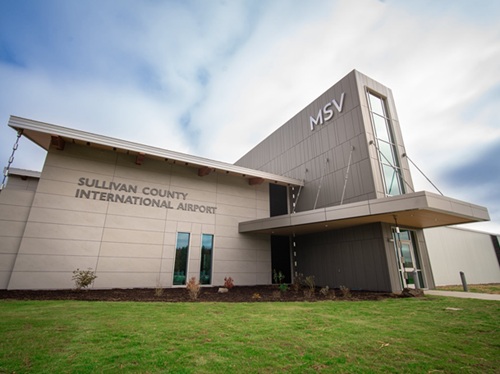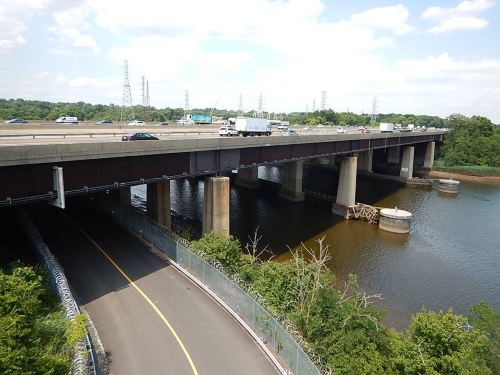The American Association of State Highway and Transportation Officials along with three other organizations are urging Congress to take three “critical steps” to address the “unstable future” created by significant declines federal and state transportation and other revenues caused by the COVID-19 pandemic.
[Above photo by the New Jersey DOT.]
“Public agencies continue to face COVID-19 -induced revenue declines,” noted AASHTO, the American Road & Transportation Builders Association, Associated General Contractors of America, and the U.S. Chamber of Commerce in letter being sent to Congressional leadership on September 8.
“As a result, state and local entities already delayed or cancelled $8 billion in surface transportation projects, with more on the horizon absent any clear sign of support from the federal government,” they said. “Timely action by Congress will tangibly enhance the quality of life for all Americans and jump start the nation’s economic recovery.”
[Jim Tymon, AASHTO’s executive director, explained in the video interview below how those “critical steps” are part of a “plan for greater investment” that will keep projects operating and people working so America’s transportation infrastructure will keep providing what the nations need “for decades to come.”]
The three critical steps those four organizations are urging Congress to take are:
- Pass a one-year extension of the current surface transportation funding law: The Fixing America’s Surface Transportation or FAST Act – the current surface transportation funding law – expires on September 30. A one-year extension of federal surface transportation funding would enable the planning, letting, and building of projects through the 2021 construction season. The groups added that this extension should be “turn-key,” meaning it avoids the inclusion of new policies and programs that could delay the critical distribution of federal funding. At the same time, that extension should enable state departments of transportation and public transit agencies to address specific impacts of the COVID-19 outbreak pandemic with funding “flexibility.”
- Provide a fiscal “backstop” to state DOTs and public transit agencies: State DOTs and public transit agencies are facing severe losses in state transportation and other revenues due to a falloff in motor vehicle fuel taxes; a result of severe declines in motor vehicle traffic spurred by stay-at-home orders issued to reduce the spread of the COVID-19 virus. Because of that funding falloff, their ability to carry out core functions – including capital construction programs – is threatened. Many state DOTs and public transit agencies are imposing furloughs, while delaying or cancelling more than $8 billion in surface transportation projects, threatening the viability of many businesses. AASHTO estimates state DOTs need $37 billion through fiscal year 2024 to offset state transportation revenue losses. Similarly, the American Public Transportation Association estimates public transit agencies require an additional $32 billion on top of the $25 billion in emergency funding the industry received in March to offset pandemic-related costs and revenue losses. “These infusions of emergency federal funding for state DOTs and public transit agencies will forestall public and private sector job losses and prevent further disruptions to projects that provide long-term benefits to the economy,” the groups said in their letter.
- Ensure the solvency of the Highway Trust Fund: Motor fuel tax and trucking user fee revenues supporting the HTF, which supports federal surface transportation funding, is falling dramatically due to the COVID-19 outbreak. Yet even before the pandemic began, projections indicated those taxes and user fees would fall $195 billion short of current surface transportation funding needs. In fact, the Congressional Budget Office recently noted that by fiscal year 2021, the HTF would be short more than $1.36 billion.
“The HTF’s shortfall must be addressed for the duration of a one-year extension at a minimum,” the groups tell Congress in their letter. “Failure to approve a one-year extension with increased funding will only exacerbate this dire situation.”

In fact, a new 10-year report from the Congressional Budget Office indicates the Highway Trust Fund will become insolvent in fiscal year 2021.
The CBO predicts that by the end of FY 2021, if current funding levels remain the same, the highway account will face an $828 million cash shortfall while the mass transit account will face a $540 million cash shortfall – more than $1.36 billion in total.
Brian Bezio, FHWA’s chief financial officer, noted during a virtual meeting of the American Association of State Highway and Transportation Officials Council on Highways and Streets in July that ongoing declines in motor fuel taxes and other fees alongside the transportation impacts of the COVID-19 pandemic are speeding up the shortfall being experienced by the HTF.

“There is a lag in the collection of data – essentially a one-month lag between economic activity and when [HTF] taxes are deposited,” Bezio said. “While [HTF] deposits are trending back up a little bit, they are still way below comparative 2019 levels; we’re down $2.7 billion for the year so far.”
And though he stressed that the HTF “won’t go broke or insolvent,” payouts to states will be “resized” in accordance with tax money coming into it.
“When the [HTF] balance falls below $4 billion is when we start looking at reducing disbursements to the state,” Bezio said. “The last time we approached this situation was in 2014. Our original [COVID-19 impact] model projected a 40 percent reduction [in HTF tax revenues] thru May before then slowly increasing back to normal levels by October 1. Now the balance may start to hover at that $4 billion [level] by the fall and winter months this year.”
 Top Stories
Top Stories
New Study Finds Cannabis Use Impacting Vehicle Crashes
October 17, 2025 Top Stories
Top Stories

